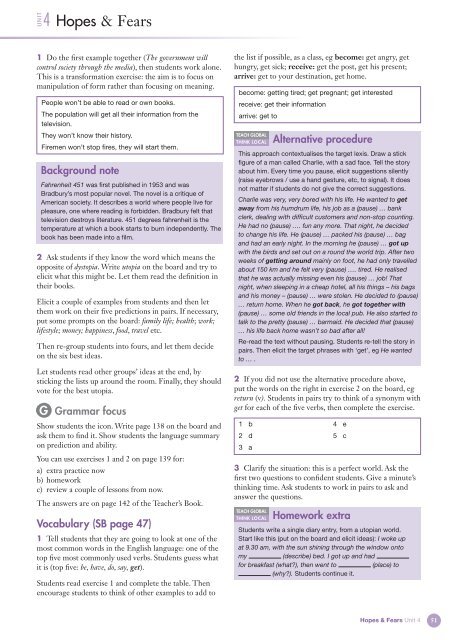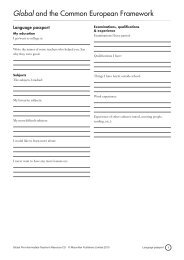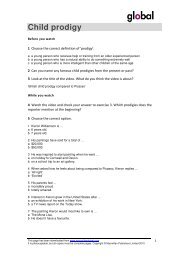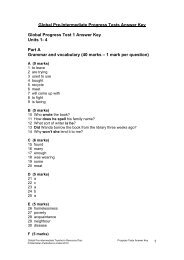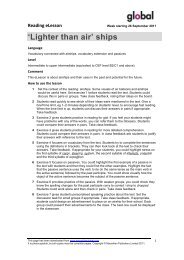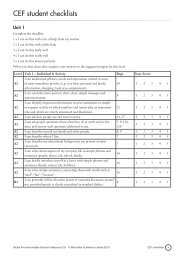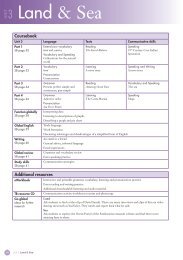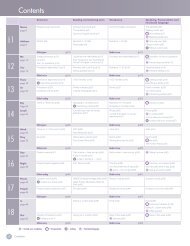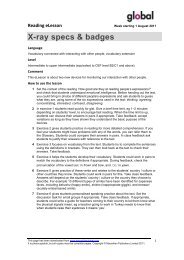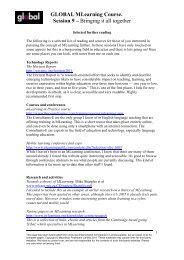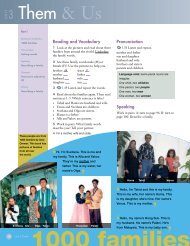Teacher's Book teaching notes - Global
Teacher's Book teaching notes - Global
Teacher's Book teaching notes - Global
You also want an ePaper? Increase the reach of your titles
YUMPU automatically turns print PDFs into web optimized ePapers that Google loves.
UNIT4Hopes & Fears1 Do the first example together (The government willcontrol society through the media), then students work alone.This is a transformation exercise: the aim is to focus onmanipulation of form rather than focusing on meaning.People won’t be able to read or own books.The population will get all their information from thetelevision.They won’t know their history.Firemen won’t stop fires, they will start them.Background noteFahrenheit 451 was first published in 1953 and wasBradbury’s most popular novel. The novel is a critique ofAmerican society. It describes a world where people live forpleasure, one where reading is forbidden. Bradbury felt thattelevision destroys literature. 451 degrees fahrenheit is thetemperature at which a book starts to burn independently. Thebook has been made into a film.2 Ask students if they know the word which means theopposite of dystopia. Write utopia on the board and try toelicit what this might be. Let them read the definition intheir books.Elicit a couple of examples from students and then letthem work on their five predictions in pairs. If necessary,put some prompts on the board: family life; health; work;lifestyle; money; happiness, food, travel etc.Then re-group students into fours, and let them decideon the six best ideas.Let students read other groups’ ideas at the end, bysticking the lists up around the room. Finally, they shouldvote for the best utopia.G Grammar focusShow students the icon. Write page 138 on the board andask them to find it. Show students the language summaryon prediction and ability.You can use exercises 1 and 2 on page 139 for:a) extra practice nowb) homeworkc) review a couple of lessons from now.The answers are on page 142 of the Teacher’s <strong>Book</strong>.Vocabulary (SB page 47)1 Tell students that they are going to look at one of themost common words in the English language: one of thetop five most commonly used verbs. Students guess whatit is (top five: be, have, do, say, get).Students read exercise 1 and complete the table. Thenencourage students to think of other examples to add tothe list if possible, as a class, eg become: get angry, gethungry, get sick; receive: get the post, get his present;arrive: get to your destination, get home.become: getting tired; get pregnant; get interestedreceive: get their informationarrive: get toTEACH globalThink localAlternative procedureThis approach contextualises the target lexis. Draw a stickfigure of a man called Charlie, with a sad face. Tell the storyabout him. Every time you pause, elicit suggestions silently(raise eyebrows / use a hand gesture, etc, to signal). It doesnot matter if students do not give the correct suggestions.Charlie was very, very bored with his life. He wanted to getaway from his humdrum life, his job as a (pause) … bankclerk, dealing with difficult customers and non-stop counting.He had no (pause) …. fun any more. That night, he decidedto change his life. He (pause) … packed his (pause) … bagand had an early night. In the morning he (pause) … got upwith the birds and set out on a round the world trip. After twoweeks of getting around mainly on foot, he had only travelledabout 150 km and he felt very (pause) …. tired. He realisedthat he was actually missing even his (pause) … job! Thatnight, when sleeping in a cheap hotel, all his things – his bagsand his money – (pause) … were stolen. He decided to (pause)… return home. When he got back, he got together with(pause) … some old friends in the local pub. He also started totalk to the pretty (pause) … barmaid. He decided that (pause)… his life back home wasn’t so bad after all!Re-read the text without pausing. Students re-tell the story inpairs. Then elicit the target phrases with ‘get’, eg He wantedto … .2 If you did not use the alternative procedure above,put the words on the right in exercise 2 on the board, egreturn (v). Students in pairs try to think of a synonym withget for each of the five verbs, then complete the exercise.1 b2 d3 a4 e5 c3 Clarify the situation: this is a perfect world. Ask thefirst two questions to confident students. Give a minute’sthinking time. Ask students to work in pairs to ask andanswer the questions.TEACH globalThink localHomework extraStudents write a single diary entry, from a utopian world.Start like this (put on the board and elicit ideas): I woke upat 9.30 am, with the sun shining through the window ontomy(describe) bed. I got up and hadfor breakfast (what?), then went to(place) to(why?). Students continue it.Hopes & Fears Unit 4 51


